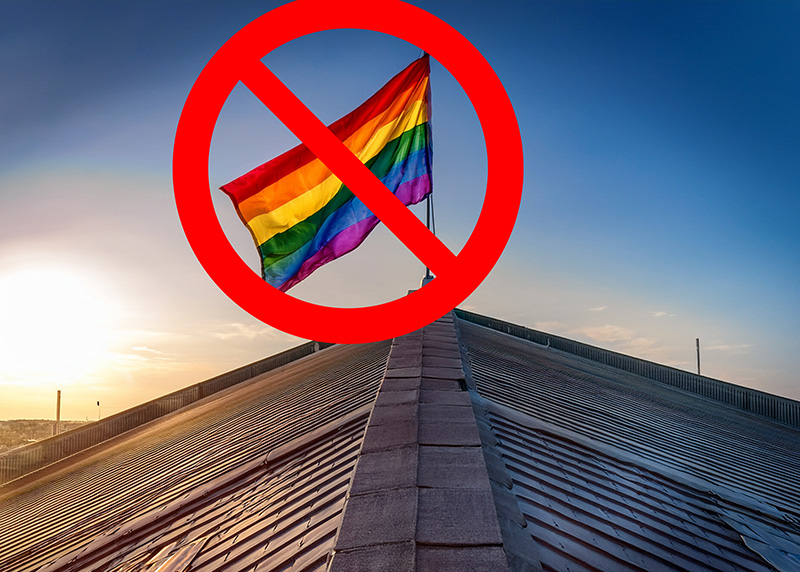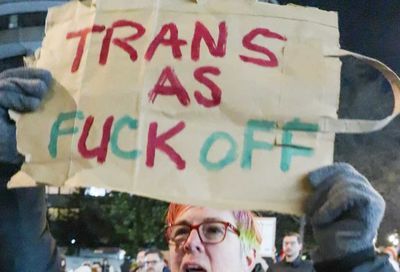Capitol Hill Politicians Push Dueling Bills on Trans Military Service
Republicans want to bar transgender troops from serving, unless they remain in their assigned sex at birth.

Republicans and Democrats are pushing opposing bills dealing with transgender military service, signaling that, for some, anti-LGBTQ animus remains a winning issue on Capitol Hill.
The “Ensuring Military Readiness Act,” introduced by Sen. Marco Rubio (R-Fla.) and Rep. Jim Banks (R-Ind.) in February, would reverse current Defense Department policy by prohibiting all transgender military members from serving in the Armed Forces.
The bill goes even further than the previous ban on transgender service members instituted by the Trump administration, in which some individuals who had transitioned prior to the ban were “grandfathered” in, meaning they could continue serving without incident, while those wishing to transition in the future or currently in the process of transitioning could not.
Under the Rubio-Banks bill, the Department of Defense would be forced to adopt regulations prohibiting people who identify as transgender or have been diagnosed with gender dysphoria from serving, except in rare circumstances.
Those exempt from the ban are people who may identify as transgender but have remained stable in their assigned sex at birth for 36 months prior to joining the military, and members who are diagnosed after entering the military but who do not attempt to medically transition.
Under the bill, those who have been diagnosed with gender dysphoria may only serve in their assigned sex at birth. Those who identify as transgender but have never been diagnosed with gender dysphoria may also serve in their assigned sex at birth, and are expected to adhere to all fitness and dress code standards for that gender.
However, any person who has undergone surgical transition — even under previous administrations with affirming policies — would be prohibited from continuing to serve.
Under the bill, 90 days after its enactment into law, the Defense Department would be forced to adopt regulations requiring individual service members’ gender markers in the Defense Enrollment Eligibility Reporting System to match their assigned sex at birth, regardless of whether a person’s gender marker was previously amended.
Currently, there are an estimated 15,000 transgender people overall serving in the various branches of the U.S. military.
While the bill is unlikely to pass while the U.S. Senate remains under Democratic control and a Democratic president is in the White House, a future Republican administration could use executive action to impose the Rubio-Banks recommendations, or could sign such restrictions into law once passed by a Republican Congress.
On Thursday, a U.S. House Armed Services subcommittee heard testimony on the military’s diversity, equity, and inclusion policies, with Republicans in charge of the subcommittee hoping to use the testimony to justify their claims that the Biden administration’s focus on diversity and inclusion have hampered military readiness.
Sen. Tommy Tuberville (R-Ala.), one of the bill’s original co-sponsors, has argued that allowing transgender people to serve in the military sows “division” among rank-and-file military members, making it more difficult for them to do their jobs. Other proponents of a ban claim that the mere presence of transgender service members in the Armed Forces is discouraging potential recruits from conservative backgrounds from enlisting, according to the Military Times.
Jon Schweppe, the director of policy at the anti-LGBTQ think tank known as the American Principles Project, told the Military Times that people from the South — who comprise a disproportionately larger chunk of recruits — are skeptical of pro-LGBTQ policies that run counter to their religious views or conservative values.
“We want to make sure we have a full fighting force,” he said. “But I would actually posit that this direction the military has gone is very out of step with the American people… and probably hurting recruitment numbers.”
From the other side of the aisle, Rep. Sara Jacobs (D-Calif.) introduced legislation earlier this week to allow transgender military members to continue serving, and prohibit discrimination against them.
The bill, the “Ensuring Military Readiness Not Discrimination Act” — also known as the “Truman Amendment,” referring to the former president’s executive order integrating the Armed Forces back in the 1940s — seeks to prevent future administrations or Congresses from instating policies like “Don’t Ask, Don’t Tell” or the Rubio-Banks bill.
To accomplish this, it amends the language of the Truman Amendment to prohibit discrimination based not only on race, but a host of other characteristics, including sexual orientation and gender identity.
Jacobs’s bill has been endorsed by a host of LGBTQ or LGBTQ-friendly organizations, including SPARTA, the Modern Military Association of America, Minority Vets, and American Veterans for Equal Rights.
“Anyone willing and able to serve our country should be able to serve authentically,” Jacobs, the vice-chair of the Congressional Equality Caucus and co-chair of the Transgender Equality Taskforce, said in a statement. “Yet, discrimination of all kinds, especially against the transgender and gender-nonconforming communities, prevents our military from recruiting and retaining the best and brightest and weakens military readiness.
“As our military faces recruitment and retention challenges, we need to ensure that our policies reflect our military’s values of equality, diversity, and inclusion,” she added. “I’m proud to introduce the “Ensuring Military Readiness Not Discrimination Act,” which will ensure that no President can enact discriminatory policies in the military with the stroke of a pen or a tweet.”
Some transgender military members currently serving in the Armed Forces report living with a great deal of uncertainty, given that their ability to serve fluctuate depending on the whims of whatever political party holds the White House. Opponents of the ban say that yet another reversal of policy will affect transgender service members’ long-term employment and financial stability, and takes a toll on their mental well-being.
Opponents of the ban note that transgender individuals are statistically twice as likely as the general population to have served in the military, according to a study by the National LGBTQ Task Force and the National Center for Transgender Equality. As such, prohibitions on their service depletes a potential reserve of military members at a time when the Armed Forces are struggling to meet their current recruitment goals.
According to the Army Times, the U.S. Army missed its recruitment goal by 25% last year, falling 15,000 soldiers short of its recruiting targets, while the U.S. Air Force was just barely able to meet its recruitment targets for 2022, and the U.S. Navy only surpassed last year’s target by 42 recruits.
Cathy Marcello, the director of the Modern Military Association of America’s MilPride program, praised Jacobs’s effort to amend the Truman Amendment as a way to ensure stability for transgender service members whose fates have historically been left to the whims of politicians.
“The Modern Military Association of America believes that all who are capable of serving this nation should have the opportunity to serve” Marcello said in a statement. “Enshrining into law that military service cannot be limited by any criteria relating to the race, color, national origin, religion, or sex (including gender identity, sexual orientation, or sex characteristics (including intersex traits of an individual)) is a critical step in ensuring the recruitment, readiness and retention of our armed forces.”
Support Metro Weekly’s Journalism
These are challenging times for news organizations. And yet it’s crucial we stay active and provide vital resources and information to both our local readers and the world. So won’t you please take a moment and consider supporting Metro Weekly with a membership? For as little as $5 a month, you can help ensure Metro Weekly magazine and MetroWeekly.com remain free, viable resources as we provide the best, most diverse, culturally-resonant LGBTQ coverage in both the D.C. region and around the world. Memberships come with exclusive perks and discounts, your own personal digital delivery of each week’s magazine (and an archive), access to our Member's Lounge when it launches this fall, and exclusive members-only items like Metro Weekly Membership Mugs and Tote Bags! Check out all our membership levels here and please join us today!
























You must be logged in to post a comment.